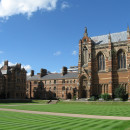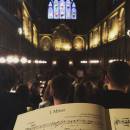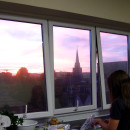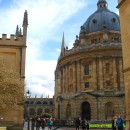A great place to try out academic independence! Past Review
By A student (Middlebury College) - abroad from 09/01/2016 to 04/15/2017 with
Middlebury Schools Abroad: Middlebury – CMRS Oxford Humanities Program
The independence made me take responsibility for every aspect of my daily life and work, which helped me understand what I really find important. It was worthwhile, not only because I felt like I got a taste of grad school, but because I met people who were willing to dive into conversations about the nature of life, art, and purpose. My study abroad has given me a foundation of confidence in my ability to learn and adapt.
Review Photos





Personal Information
| How much international exposure did you have prior to this program? | 0-2 weeks |
Review Your Program
|
* Overall educational experience
Academic rigor, intensity, resources, etc. |
This is a rigorous program, intentionally organized to teach students how to be independent researchers. If you go into it with an open attitude, it can be a transformative academic experience. I started to approach academic work with more enthusiasm and curiosity than ever before. One wonderful feature of the Oxford tutorial system is that your professors sincerely want to work on what interests you most, and you have a wealth of resources available to help you dive deep into a specific topic. I had the freedom to take courses inside and outside my major, and to design several of my own courses. As other reviewers have mentioned, the workload is demanding and motivates you to develop time management strategies. I didn't go into the year considering myself a naturally independent learner, but I knew I wanted to build those skills, and I made progress. |
|
* Host Country Program Administration
On-site administration of your program |
The members of the CMRS team are incredibly helpful and generous with their time and energy and are committed to making the program as good as it can be. They place student health, physical and mental, above academic perfection, and invite students to come and talk about anything on their minds. They love to share English culture and to offer wit, wisdom, and advice on academic careers. They also helped me find and take advantage of unexpected opportunities in many areas of study. I felt personally supported, respected, and encouraged at CMRS, and I'm really grateful. |
|
* Housing:
How satisfied were you with your living arrangements? |
I was pleasantly surprised! CMRS is itself almost like a small Oxford college, with an on-site library and classrooms. Many of the rooms have high ceilings and/or views. I really appreciated having a large and well-furnished kitchen. Living in the city center is convenient because grocery shopping is easy and none of the colleges where you might have classes are too far away. The chimes of local bell towers are a constant cultural presence. |
| * Food: |
I cooked in the kitchen the majority of the time and made a habit of going to the Wednesday outdoor market for fresh fruits and vegetables. I was also in Keble dining hall at least twice a week (the system is pay-as-you-go, but choir members get some free meals). The quality of Keble food varies, but there are always multiple options. |
|
* Social & Cultural Integration:
How integrated did you feel with the local culture? |
It was emphasized right from orientation that you have to go out and make an effort to make non-American friends. I got involved in the choral music scene in Oxford and became close with the people I sang with, especially at Keble College. Although Brits may initially seem cold and relatively unsmiling, many of them are just straightforward. They really do welcome new friends. Culturally, it was not an extreme adjustment, but since I had never traveled outside of the U.S. and Canada, I observed and adjusted to a fair number of differences. (Tea, pubs, and true punctuality.) It was great to live in a place where so many people are so intellectually curious and ready to have seriously interesting conversations. |
|
* Health Care:
How well were health issues addressed during the program? |
The program helped me with transportation when I had to see a specialist. Wait times at the clinic were long, but I got the treatment I needed. |
| * Safety: |
I didn't feel unsafe. I knew my way around and walked purposefully at night, and no one bothered me. |
| If you could do it all over again would you choose the same program? |
Yes
For a liberal arts student, this program offers more freedom of choice than a direct enrollment program, and I found a great community here. |
Finances
|
* Money: How easily were you able to live on a student's budget?
(1 = not very easy/$200+ on food & personal expenses/week, 2.5 = $100/week, 5 = very easily/minimal cost) |
Oxford is a relatively expensive place to live, but I enjoyed cooking for myself and avoided big expenses. |
| Not including program expenses, about how much money did you spend on food and other expenses each week? | $60 |
| Do you have any general money-saving tips for future study abroad participants? | I really recommend cooking your own meals. Cooking was relaxing for me, and I loved sharing meals with other people (it's also cheaper to buy in bulk). It's not necessary to buy more than a handful of books. Plenty of people visit Oxford for clothes shopping, but I bought very few things. |
Language
| * Did your program have a foreign language component? | No |
Other Program Information
|
* Where did you live?
Select all that apply |
|
|
* Who did you live with?
Select all that apply |
|
|
* Who did you take classes with?
Select all that apply |
|
| About how many local friends did you make that you will likely keep in touch with? |
A Look Back
| * What did you like most about the program? |
|
| * What could be improved? |
|
| * What do you know now that you wish you knew before going on this program? | It's okay to sign up for more clubs than you can possibly do. Most Oxford students sign up to receive emails from many clubs but feel no pressure to attend every meeting. |
Reasons For Studying Abroad
| To help future students find programs attended by like-minded individuals, please choose the profile that most closely represents you. |
The Academic or LinguistYou went abroad with specific academic goals in mind; the program credentials and rigor of your coursework abroad were very important to you. You had a great time abroad, but never lost sight of your studies and (if applicable) were diligent with your foreign language study. Good for you! |
Individual Course Reviews
| Course Name/Rating: |
Research in Renaissance Polyphony |
| Course Department: | Music |
| Instructor: | Matthew Cheung Salisbury |
| Instruction Language: | English |
| Comments: | This four-week dedicated research course was a valuable and memorable experience. I chose exactly the musical topic I wanted to work with, motion by the interval of a third in vocal music of the Renaissance, and MCS helped me choose a group of primary sources that would be manageable and offer meaningful answers to my theoretical question. I deconstructed three pieces of music and learned historical music theory not from a textbook, but from a translation of the original treatises in Latin. Writing this analytical essay sparked a lot of thought, and I expect to be building on it for years to come. |
| Credit Transfer Issues: |
| Course Name/Rating: |
Old French |
| Course Department: | N/A |
| Instructor: | Alex Kerr |
| Instruction Language: | English; French |
| Comments: | After having studied modern French in school for 9 years, I was intrigued by the idea of studying its roots. Since I had space for electives, I had the chance to take a tutorial in Old French, which turns out to be a very different language. Over the 8 weeks of the course, assignments were designed to match my evolving interests in pronunciation, translation, and the integration of music in literature. I loved the challenges of translation, and I was able to join a reading group that met weekly to decipher texts in Old French dialects out loud. I would not have been able to do this anywhere else. |
| Credit Transfer Issues: |
| Course Name/Rating: |
Shakespeare |
| Course Department: | English |
| Instructor: | Ralph Hanna III |
| Instruction Language: | English |
| Comments: | In this eight-person seminar, we read eight plays in eight weeks. Our discussions were not always obviously productive, but I've come out with a better understanding of Shakespeare and the many different perspectives a literary analysis can take. We were assessed on one presentation and one paper. |
| Credit Transfer Issues: |
| Course Name/Rating: |
Music in Medieval Liturgy |
| Course Department: | Music |
| Instructor: | Matthew Cheung Salisbury |
| Instruction Language: | English |
| Comments: | When I started this course, I didn't know how important it would become to my undergraduate career. I started to research the sacred music of medieval England, and I became fascinated by the different world of melody and musical relationships within it. Being in Oxford, I had the opportunity and built the ability to study over a dozen original manuscripts never before studied in detail. This tutorial became a crash course in paleography, as I learned to translate ecclesiastical Latin and neumatic notation judiciously. I was assessed on weekly reports. My tutor is an expert in the field and was happy to show me the details of his research methods and ideas about performance practice. This work has influenced me as a scholar and as a composer, and has inspired my senior thesis. |
| Credit Transfer Issues: |








